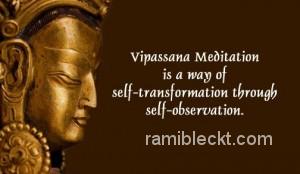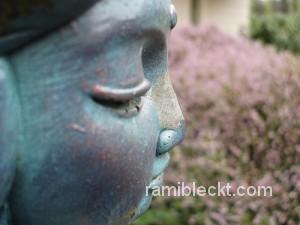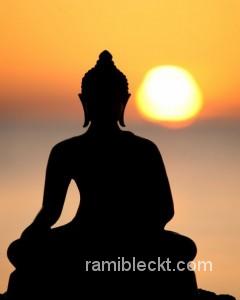One of the Buddha’s s disciples asked him: “You gave so many teachings to many people on diverse subjects for the last fifty years. Some of them were contradictory and I don’t know which of them to follow.” Buddha replied: “Live your life with awareness, the rest will follow you”
I few years ago I attended Vipassana meditation course. It was not the first time for me. I would recommend it to everyone. This time I was motivated by intention to work on my personal development, as when you teach others, your self-development fades into the background. Personal development should be the primary goal.
During the Vipassana meditation one is required to remain silent for the duration of 10 days and meditate constantly. The technique is very simple, efficient and doesn’t not interfere with any spiritual path, religion affiliation. If one wants to be successful in his life, this technique is very useful. The technique instructs to be “here and now”, more precisely, it accustoms and develops the skill and teaches to dissolve one’s ego and become a loving presence.
This time I had an interesting experience, when I came back from a trip, I had a pile of work, emails, and I haven’t seen my family for a while, but, unexpectedly, I got the confirmation to attend the Vipassana course and I had to leave again. I had to reply dozens of emails, and to post a blog, etc. — all this I had to do in my break time from lessons with my children, and I have been so busy that I was talking on the phone all the way to Vispassana centre.
Upon arrival you hand in your cell phone, luckily I was given a single room which happens rarely. Vipassana centres are located all over the world, the Canadian center, Dhamma Torana in my opinion, is the most comfortable. I was lucky, the course manager told me later, as it was the most peaceful and trouble-free course of all that he ever saw.
I handed in the car keys, my cell phone, and its was interesting to observe my rebelling mind. During the first few days, the most difficult was to observe the breath. In general, the following days are not physically and mentally easy, however the mind is getting cleared very intensively, and the clear, restful mind,with ability to focus is the basis for success in all aspects of life.
The emphasis in Vipassana meditation technique is put greatly on the practice rather than philosophical reflections and a number of important psychological knowledge, information and techniques are given during this course. I was told that Buddhism was recognized as the best psychotherapy of our century at the World Congress of psychotherapists in Tokyo and I believe there is a merit in it. The mind which is our enemy, causing a lot of suffering and bringing a lot of misery and illnesses into our lives, psychological and mental health disorders. If you follow these advice and practice the mind becomes our friend, fills our lives with peace, tranquility, happiness and the ability to solve any problems efficiently. Only this state of mind can lead one to a rapid, genuine spiritual growth.
During the course the main Buddhist ideas are taught:
- Non-attachment;
- Attainment of a totally clear peaceful mind;
- The ability to not get involved internally into hectic life and just to be an observer;
- To understand the temporality of all things;
- You need to follow strong determination and constant practice if you want to progress at all the levels. An excessive devotion to philosophical and intellectual reflections, rituals can become a formidable obstacle — the liberation can be attained through one’s own efforts;
- The major problem is our constant reactions. We are driven to pleasant things and we dislike unpleasant things. Â The stronger is the involvement into a situation, the stronger is the memory trace, the imprint (samskara) in our mind and in our subconscious and these samskaras (subconscious programs) and are the source of all problems. But thanks to this technique, we can cease operating time of new samskaras and quickly get rid of the old ones (if we practice seriously), we develop an ability to be independent of external circumstances. And as the Buddhist teachers claim: “We come out of the influence of the laws of karma”;
- The purpose is to dissolve your ego, to become selfless, and only then you can become a peaceful, successful and happy person, a loving presence, a loving kindness.
There are three forms of samskaras:
- samskara on water
- samskara on sand
- samskara on granite
The third one (samskara on granite) is most dangerous one. The unconscious programs are difficult to eliminate. It’s based on our constant reactions, such as anger.
Stephen Covey, a genius of modern business psychology, wrote that one of the main and the first habits of a highly effective person is the ability not to depend on external circumstances. He gave an interesting description of a mind activity: we have six senses (hearing, touch, smell, taste, sight, and the mind is in this scale). These six senses have six separate vijnanas and 4 steps in mind activity.
- Vijnana is a learning part of the mind, which lets us to perceive the world, for example, the sound interacts with an ear (the vijnana of hearing)
- Sanna is a cognitive part of the mind. Recognition and analysis are taking place at this level: good /bad, pleasant /unpleasant (for the senses and ego).
- Vedana is a sensitive part of the mind. The sensations, reactions on the body level. Our body reacts constantly: goose bumps, stress, relaxation, etc.
- Sahasra is a responsive part of the mind. Our mind reacts and this action yield fruit, unlike the previous ones.
As the result of Vipassana meditation, the fourth part is weakening and the first one is getting stronger, therefore we cease to react and begin to observe. Our sufferings fade away. New programs are not forming, the old programs disappear. The samskaras on water appear, in other words, the new karma is not forming, the old karma is dissolving.
The Vedic psychology says this process can be enhanced and accelerated with the help of mantras and prayers. In Vipassana method mantras and prayers are not welcome (although the mantras and chantings before and after mediation take place). I also somewhat disliked that they praise the particularity of this technique, and the other spiritual Paths are downgraded. Nevertheless, from my point of view, Vipassana meditation can be a tool, a way to achieve the Highest goal of life, and simply can help to progress at all four levels. I haven’t seen a spiritually advanced person, who would use Vipassana meditation not as a mean or a tool, but as a goal.
If you get a chance, I recommend to take this course, as far as I know they held in Russia and Ukraine as well. If you speak English, you can take the course anywhere in the world, which is conducted in other languages. In Canada by the way, you can get a headphones and listen the lectures in Russian. The course is free of charge, you can donate as much as you want and as much as you can at the end of the course.
Everyone who participates in the organization of the course from teachers to janitors, are not paid, nor accept any presents. These are happy people, who once benefited from this course, however as I noticed practically no one of them becomes a Buddhist afterwards.
I am not related to this course, so if you want to take it, contact them directly through their website, and I do recommend you to, if you determined to take the course, set yourself up to ten days course no matter how hard it will be for you. By the end of the tenth day, just the thought that the course is over, some people experience an overwhelming sense of joy and euphoria, and as they now accustomed are not attaching 🙂
******
As I finished writing the blog entry, I see the blizzard outside my house, although now it’s the end of April 2012 and it is unusual even for Canada. About one month ago it was plus 30C and it was even unexplainable. People have been skiing in their shorts.
I felt discontented with the plans changes due to the unforecast storm and snowfall. Equanimously I observed the emotion and it was dissolving with no trace. I went to a swimming pool which is twenty-five minutes away from home, suddenly they announced the pool’s closing for three weeks and again, I felt growing discontent, and while I was observing it passing away, the clear intuitive solutions of the minor problem appeared.
I checked my emails, there were pleasant and unpleasant news, I kept observing the appearing emotions without involving into it (observing the breath and appearing body reactions), they pass away. Intuitive solutions and creative inspirations come when the space of mind is calm and pacified. Prayers and mantas chanting have an extraordinary effect in this state.
Unfortunately, this state is not easy to maintain, a regular practice is required. And I find its difficult to maintain it when I am physically overloaded, when I consult my clients, when I travel a lot, I experience metabolic disorders, when I have to switch from one energy level to another: from immersion to management.
I remember the words from the Gita:
“O best among men, the person who is not disturbed by happiness and distress and is steady in both is certainly eligible for liberation.” Bhagavad-Gita 2.15
“But a person free from all attachment and aversion and able to control his senses through regulative principles of freedom can obtain the complete mercy of the Lord.” Bhagavad-Gita 2.64
“There are principles to regulate attachment and aversion pertaining to the senses and their objects. One should not come under the control of such attachment and aversion, because they are stumbling blocks on the path of self-realization.” Bhagavad-Gita 3.34
*****
Vedas also say a lot what it takes to rise above Raga (sympathy, affection) and Dvesha (antipathy, disgust), and then a man becomes the master of his own destiny, that person cannot be manipulated.
Swami Sivananda, a great enlightened master, used to say that “the one who raises above sympathies and antipathies, attachment and aversion, hatred and love, is no longer connected to his nature. The essence of the sacred writings is revealing to him. His mind is clear.”
Another Vedic enlightened person Patanjali, in his famous compiler of Yoga Sutras (Samadhi Pada 1.2), wrote:
“yogash-citta-vritti-nirodhah” — Yoga is a complete mastery over the modifications of the mind, or more complete translation: Yoga is an ability to direct your conscious fully and entirely to one object and to keep up the direction staying focused. Yoga is cessation of movements (fluctuations) of consciousness. Yoga is a transcendency of the mind’s activity.
That’s what Buddha used to say was already told before him however in different words. Well, enough of philosophy… I’d better go practice. And I wish the same to you.
*****
Post Scriptum
I wanted to share an interesting parable, that I heard at the course and some more buddhist parables:
One man got sick and went to get doctor’s help. The doctor examined him and prescribed a medication. The patient had a strong believe in the doctor. He came back home, put portrait or statue of the doctor in his beautiful corner, then paid obeisance to the doctor’s portrait or statue: bowed three times, offered flowers, perfumes with a censer, then he took the prescription and solemnly read it out loud: “Two pills in the morning! Two pills in the evening!”
He kept reading the prescription all his life, because he had a perfect confidence in his doctor, however reading the prescription was not helping him. So the patient decided to find out more about the prescription, and he run to see the doctor and asked him: “Why did you prescribe this medication to me? How can it help me?”
As an intelligent person, the doctor explained:
“Listen, this is your illness, and this is the cause. If you take the prescribed medication, it will eliminate the root cause of the illness. When the cause is removed, the disease itself will disappear.” The patient thought: “How wonderful! My doctor is clever! His prescription is so helpful!” And he went home and argued with his neighbors and friends, insisting that his doctor is the best, all other doctors are useless.
So what he got from his arguments? He could keep fighting all his life and this would not help him. If he took the medication, then he could eliminate the illness and his suffering. Only then the medication would help him.
Every liberated person is like a doctor. He prescribes medications out of compassion, gives advice to people, tells them how to liberate from their sufferings. If people develop a blind faith in this person, they turn the prescription into a holy script and argue with other religions, asserting that the doctrine of his founder is the supreme. But nobody is concerned about practicing the teaching, taking the prescribed medication to cure the illness. It is helpful to have faith in a doctor, if this belief encourages to follow doctor’s advice. The understanding of the medicine effect is beneficial too, if this understanding encourages the patient to take the medicine. But one cannot cure his disease without actually taking the medication. You have to take the medicine yourself!
*****
A man came to Buddha and asked him:
- I am very rich, I don’t have children, my wife passed away. I would like to do some charity work. What can I do for poor and needy people? Just tell me what I have to do.
Buddha became very sad while listening to the man and a tear drop stole down his cheek. The man was perplexed by the Buddha’s reaction and asked:
— I see tears in your eyes, why are you upset?
Buddha replied:
— You need to help yourself before you help the others. Your main “metal” is not gold yet, there is nothing compassionate you can do now, as your energies are at a low level. You want to help people, but you not conscious enough. You do not have a true centre — the source of your compassion.
The Enlightenment
Buddha was wandering for six years, he visited all the sages and gurus, but nothing happened. He practised asceticism, fasting and yoga and it was in vain. Once Siddhartha tried to cross over a small river, and he felt in the rapid flow as he was exhausted after permanent deprivation and malnutrition, he managed to seize a long root and was washed ashore. In this state, with no strength to get out of water, he clearly realized: “Life is like an ocean. Life is like an ocean, whatever I do is wrong. If I worked myself into this condition that I cannot even cross the river, how do I want to cross the ocean of life? My path is incorrect. I became weak, and to reach God I need a lot of energy.”
He laid down under a tree and relaxed. It was a full moon night, and he slept well first time for the past six years of wandering, he was not in hurry, there was nothing more to attain; no more practicing, no more exercises to do. For the first time in his life he felt liberated. Slowly, laying under the tree, he was watching the sun rising. He was watching the last morning star disappearing in the sky. They say when the star disappeared, Siddhartha disappeared too. He saw all the six years of wander in a split second, it was a nightmare, but it was already in the past. Buddha attained enlightenment.
Soar above the faith
Once they asked Buddha: “Does God exist?” Buddha replied: “No.” The same day another person asked Buddha: “Does God exist?” He replied: “Yes.” A third person asked him about God’s existence by the evening of the same day and Buddha did not say anything, he just raised his finger towards the sky. His disciple Ananda witnessed all this and asked Buddha at night: “One thing cannot let me sleep, tell me please why did you give three different answers to the same question?”
Buddha replied: “The inquiring people were different. The first one believed there is no God, and he wanted me to straighten his believe. I replied to him that God exists. Because one can find the Truth only if he liberates himself from his believe. The second person believed that God exist. He wanted to draw confirmation of his believe too. I replied him that the God does not exist. I am here to destroy any believe, so the mind can roar above it and enter the Truth. The third person was not a believer, nor an atheist, therefore he did not need “yes” or “no”. Therefore, I did not say anything, but just showing him: “Follow me, just lapse in the silence and then you will figure it out yourself!”







